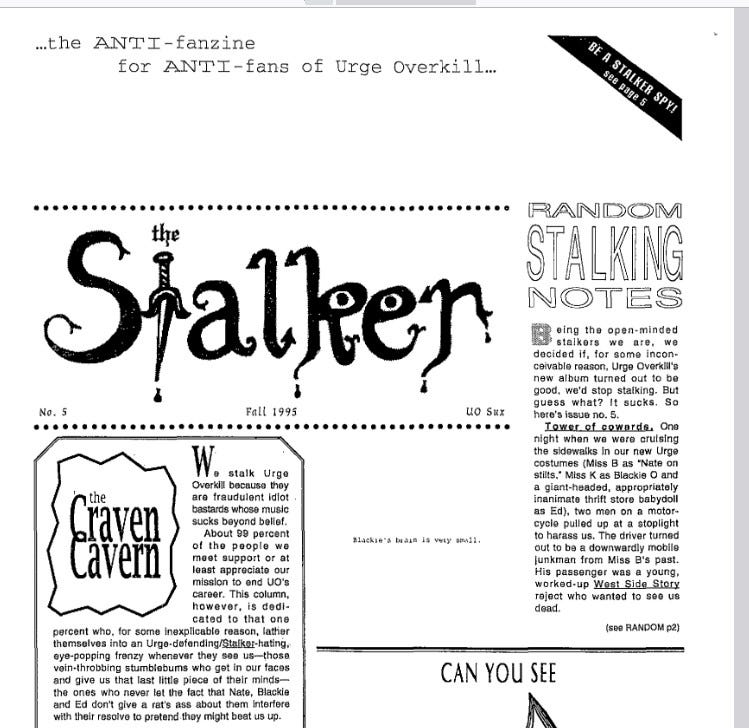The other night I went to see Liz Phair with my daughter. This turned out to be a mistake. I knew it even before she turned to me politely at the concert's end and said with a big fake smile on her face, ‘That was very good, Mom. Thanks for taking me”. It reminded me of the famous time I was forced to watch the musical “Tommy” whilst seated next to Pete Townshend; the difference was, Pete got up before the intermission so that I didn’t have to talk to him about it. But in both cases my listening pleasure was marred by having to think about what my seat companion was thinking about the entire time.
I should have known though. Why didn’t I? The artist and the album in question are way before her time, it was as if my parents had taken me to see Glenn Miller or someone. The concert, at the Masonic Auditorium, was in honor of the 30th Anniversary of the release of Liz Phair’s record “Exile In Guyville” and the show consisted of every song from it played in order, and it began with an image that was already probably incomprehensible to my daughter: a video of a cassette, marked Girly Sound, being snapped into a cassette player. And then Liz launched into the song “6 foot 1,” with its indelible chorus:
And I…keep standing 6 foot one. Instead of 5 foot two.And I loved my life. And I hated you.”
Instantly I was flung back to that time, the early 1990s, and it’s extremely particular sound and aesthetic. You know that chunky rhythm guitar with a slightly wobbly vocal atop it, and a kind of aural buzz that makes it sound like you’re hearing it in somebody’s basement? Even on record, it sounds like it’s being made right in front of you, by people just like you, unaltered, tentative, mind-to-mind, unmediated. A lot of the music from that time sounds like that, but Liz Phair’s is even more intense for those of us who heard-it-when, because on it she spoke up for an oppressed and silent population, in chords and words that rang out like the fucking liberty bell:
I want to be mesmerizing, too.
Perhaps I made a mistake by not prepping my daughter with a little background information. But when I tried to back announce it, so to speak, in the cab going home, it proved impossible. Where to begin? Chicago in the1990s was like…and when she used the C word it was…and before I heard Liz Phair I had literally seen hardly any bands fronted by a female and none who had written about my life…but…but most of all I mean…you just can’t imagine how mean everyone was being back then.
In my attempts to tell her these things, I immediately became incoherent. And she couldn’t have imagined it anyway, it was such a “You had to be there” kind of thing. Today’s music liberally uses swear words and discusses sex; there are plenty of bands that are fronted by women, and as for the meanness…I am not sure I can really capture the effect of the endless, nameless, thoughtless, ridiculous microaggressions that were aimed right at people like me…or even if I want to. Honestly. It embarrasses me to talk about it now. I am embarrassed for the things people did and said back then.
And I am embarrassed for myself too. .
But if you weren't there, I don’t think you can understand how groundbreaking and funny and just how different, and brave, that record sounded. Because a big part of Exile’s greatness is that it came out of Guyville with its middle finger up, at a time when that was beyond unheard of. And to get why that middle finger was so incredible, you first need to understand that “Guyville” was a real place, Wicker Park in Chicago, with a real set of antagonists, who oversaw the scene at the time like that kid Bob on the cartoon “Recess.”
It’s no use trying to explain how rigid the rules were, or why bands like Urge Overkill, who dubbed the area ‘Guvyille”, were so incredibly alienating (see fanzine, above), but it was definitely a time when as Liz once put it, when the way most people acted was like, “The men were men and the women were…learning.”
And then Liz threw a bombshell at them with the release of “Exile,” a double album on Matador records which was a song-by-song response to the Rolling Stones record “Exile On Main Street” only written from a woman’s point of view - and which also managed to describe what it was like to be 25 and female at that time and place, whilst, incidentally, being a masterpiece. That record could honestly serve as a template for what indie rock at its very best could sound like: honest, and dirty, and true; a visceral slice of someone’s emotional life rendered into tricky, and anthemic melodies, the kind you can sing along to.
“Exile” was a bit of a zenith, one of those singular artistic achievements that creates a before and after for everyone who hears it. And Phair’s story had a fairy tale ending, because you’ve probably never heard of Urge Overkill, but in 2020, “Exile in Guyville” was named the 56th best album in the top 500 albums of all time by Rolling Stone magazine.
That was twenty-seven years later, though. At the time it was released, its reception was muddied by the fact that you could see Liz’s nipples on the cover of the record and that the entire Chicago scene went full-tilt Rumpelstiltskin on her for supposedly ‘selling out” – i.e. getting herself on the cover of magazines, winning Pazz and Jop, and all the dumb ittle things they had lined up for themselves, but had somehow failed to accomplish.
Even without its backstory, “Exile” still stands on its own. I am pretty sure you could arrive at its doorstep with no knowledge of its genesis and still think all the songs on it are extraordinary; indeed, her audience all seemed to be people who have done that, years later.
But listening to a record and hearing it performed live are very different things, which may be why my daughter was so perplexed. Personally, I loved hearing the record again, played song by song; it contrasted so massively with other acts I’ve seen lately - U2, Taylor Swift, even the Pretenders can knock it their work out live to perfection, radiating rock stardom from thousands of meters away, beaming their charisma upon the masses. Liz Phair has never been that kind of performer, but then, she might be something better, and rarer, just a regular person up there, as always: singing what she felt like singing about. I guess, at its heart, that was what the indie scene was all about, a liminal space where that could and did happen…and probably never will again.








I lived in Guyville ‘93-‘95 next door to Inner Town Pub. It was as you described. Fondest memory was jogging north on Damen and talking to 2 guys parked in a van who were Pearl Jam’s 4 wheeled pirate radio station. He wasn’t there, but Eddie might have traveled with them. Think it was their anti-Jam tour, but could be wrong.
I listened to Exile non-stop when it came out as well as her next few albums and you describe the sound of her music and the experience so well it was like a heart massage. There was no one like her. Thanks for sharing your experience.